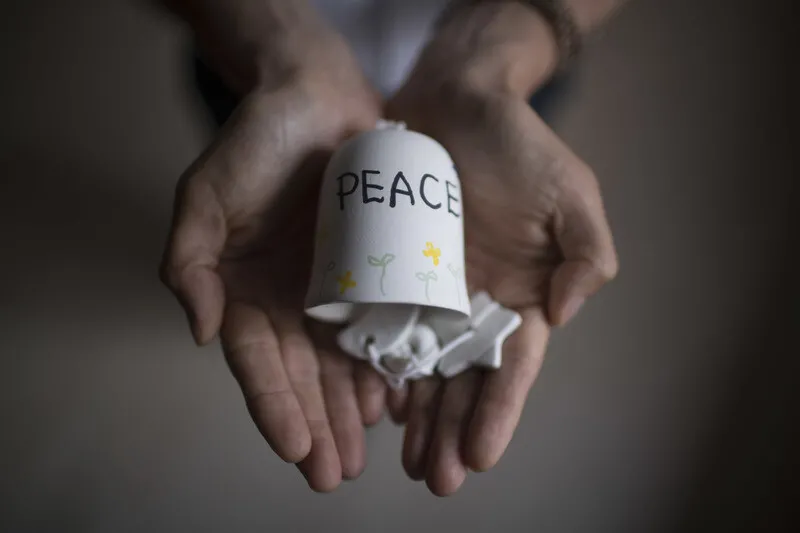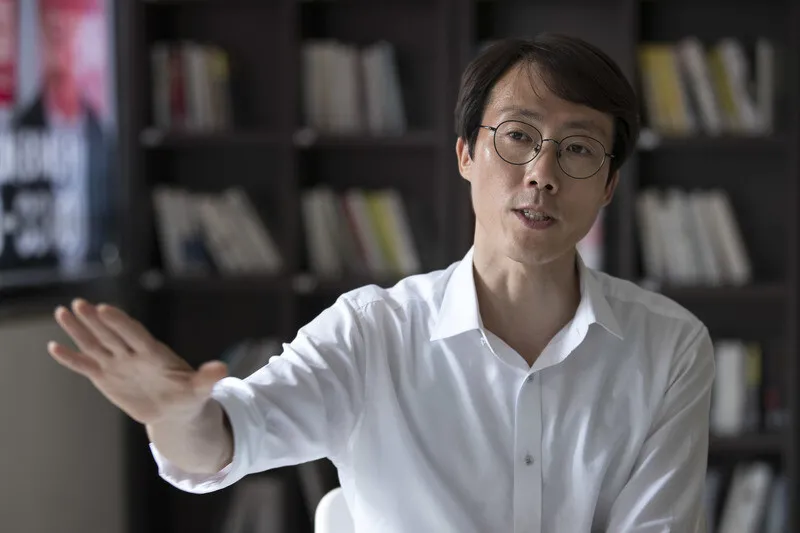hankyoreh
Links to other country sites 다른 나라 사이트 링크
[Interview] Korea’s “first conscientious objector” awaits court decision after 17 years

“I’m not the first conscientious objector. There were 10,000 before me, and there were 10,000 more after me,” said Oh Tae-yang, 43, who rejects the label. Oh met The Hankyoreh at the office of the youth-oriented party Our Future, located in Seoul’s Seocho District, on the afternoon of June 27, a day before the Constitutional Court’s decision about the section of the Military Service Act that criminalizes conscientious objection.
When more than 20,000 young people who refuse to bear arms because of their religious beliefs and convictions are suffering from prejudice and punishment, the label of the “first conscientious objector” given by the media is both a stigma and a yoke from which Oh would like to be freed.
Oh had a peaceful expression on his face when he met The Hankyoreh that day. But inside, he must have been roiling with emotion ahead of the decision, which he has spent the last 17 years waiting for. “If you have 20,000 people serving about two years in prison each, that’s 40,000 years,” he said. “It’s like something we’ve waited 40,000 years to happen.”
From the time he openly declared his conscientious objection to military service in 2001, Oh never expected an easy resolution to the issue. He believed the road had to paid with young people treading a difficult path like fallen leaves – and he was happy to serve as one of those leaves himself. With 40,000 years having piled up like so many leaves, he now awaits the Constitutional Court’s conclusion.

The biggest single influence on his decision to risk his life on the conscientious objection issue was Hankyoreh article on the topic. In Feb. 2001, The Hankyoreh printed a story about Jehovah’s Witnesses who chose to go to prison rather than take up arms. “I read about those Christians, and it came as a shock to me,” he said. “I couldn’t understand this reality that mechanically made people into ‘criminals’ for trying to uphold their religious convictions, or South Korea’s idea of judicial process, which saw no problem at all with so many people going to prison.”
Honest to the dictates of his conscience, Oh made the trip for his induction day on Dec. 2001 – not to the training center, but to the Military Manpower Administration (MMA) to announce his refusal.
His actions drew the attention of the press, which called him “South Korea’s first conscientious objector.” Seventeen years later, the Constitutional Court is set to produce a third ruling on Article 88-1 of the Military Service Act – the provision responsible for sending 20,000 young men to prison.
Once Oh had made his declaration, he was forced to change the very course of his life. As a living symbol of conscientious objection to military service, his every move became a campaign for social change in itself. “After my refusal to do military service, I felt like I should do some kind of alternative service, so I worked at a study room for low-income children and a soup kitchen for senior citizens living on their own,” he explained.
But the response from society was chilly. Every article about him that appeared on portal sites was met with thousands of replies attacking him. Some of the “haters” would show up at discussions and lectures to yell and throw water bottles.
“One day, I was scooping rice for one of the single seniors, and they hurled the tray and yelled, ‘I’m not eating rice from a traitor,‘” he recalled. An education graduate, he also had to give up his dream of teaching following his 2004 prison sentence. The past 17 years in a slowly changing world have left their share of scars behind.
Conscientious objector as lifelong Buddhist, not Jehovah’s WitnessBut Oh describes his declaration as an “important turning point in my life” – one that he has “never once regretted.” As a lifelong Buddhist, he said, he is content with a life spent faithfully honoring ahimsa, the religion’s proscription against destroying life. He described it as an affirmation of his own way of living: giving his support for the creation of a society where people with different ideas, philosophies, and convictions are not oppressed.
One of the driving forces that have helped him get through his 17-year wait has come through occasional messages of support and understanding. He can still recall a telephone call he received from a former classmate who had become a professional soldier. The day before his deployment to fight in the Iraq War, the classmate called him and told him, “I don’t agree with your ideas, but I support your choice.” Oh felt the same. “I was opposed to the sending of troops, but I also respected my friend’s choice,” he said. “Within that process, I saw the potential for different people to coexist in our society.”
Oh could also sense the campaign for peace during the criminal trials he inevitably faced for violating the Military Service Act. In May 2004, then-judge Lee Jeong-ryeol (now an attorney) acquitted Oh in his first trial. It was a revolutionary change – the kind that seemed unimaginable at a time when conscientious objection cases received “one size fits all” prison sentences of eighteen months.
“Apparently, there was talk in the judiciary at the time of this being a ‘coup d’état.‘ If the Constitutional Court does change its stance, I think Lee Jeong-ryeol will have stood at the start of that change,” Oh said.
Oh asked the Constitutional Court to show the same boldness he did 17 years go. He also asked that the Justices be told about a telephone conversation he had had two years ago from the mother of a young man in his early twenties who planned to refuse to perform military service.
“I told her that life as a conscientious objector had been very difficult for me. I said, ‘Your son is still young, and I think you should ask him to rethink whether he’s willing to follow this path for the rest of his life,’” he recalled.
Oh hopes no other young people have to be sacrificed after making the decision to refuse military service.
“It’s enough now. I want there to be more choices available to that young man than the harshness of the military or the even harsher life that awaits you after you refuse service.”
By Jung Hwan-bong and Lee Seung-jun, staff reporters
Please direct comments or questions to [english@hani.co.kr]

Editorial・opinion
![[Editorial] Inquiry must clarify if gov’t pressure led to unfair Westinghouse settlement [Editorial] Inquiry must clarify if gov’t pressure led to unfair Westinghouse settlement](https://flexible.img.hani.co.kr/flexible/normal/500/300/imgdb/original/2025/0820/5317556787190915.jpg) [Editorial] Inquiry must clarify if gov’t pressure led to unfair Westinghouse settlement
[Editorial] Inquiry must clarify if gov’t pressure led to unfair Westinghouse settlement![[Column] Does ‘KPop Demon Hunters’ count as Korean? Does it matter? [Column] Does ‘KPop Demon Hunters’ count as Korean? Does it matter?](https://flexible.img.hani.co.kr/flexible/normal/500/300/imgdb/original/2025/0820/2117556793887318.jpg) [Column] Does ‘KPop Demon Hunters’ count as Korean? Does it matter?
[Column] Does ‘KPop Demon Hunters’ count as Korean? Does it matter?- [Editorial] Trump and Putin’s Ukraine deal is a warning to countries like Korea
- [Editorial] ‘Two-track’ approach with Japan does not mean disregarding past
- [Editorial] Lee’s gestures toward North Korea, Japan are a welcome step
- [Editorial] Korea-Japan summit must acknowledge past while looking to future
- [Column] Abandon all hope, you who enter radical politics
- [Column] Can Korea say ‘no’ to the US?
- [Column] Why Yoon is cosplaying as a prisoner of conscience
- [Editorial] Cho Kuk’s pardon must serve as impetus for prosecution reform
Most viewed articles
- 1[Column] Does ‘KPop Demon Hunters’ count as Korean? Does it matter?
- 2Presidential office orders probe into KHNP’s 50-year ‘slave contract’ with Westinghouse
- 3[Editorial] Inquiry must clarify if gov’t pressure led to unfair Westinghouse settlement
- 4[ESC] ‘Runcations’ are all the rage, and Vienna is a runner’s paradise
- 5Korea mulls how to respond if US demands ‘strategic flexibility’ of USFK at summit
- 6Now in their 90s, unconverted long-term prisoners ask to be sent to North Korea
- 7USFK sprayed defoliant from 1955 to 1995, new testimony suggests
- 8Former bodyguard’s dark tale of marriage to Samsung royalty
- 9Ex-interior minister charged with ordering blackout on media outlets during martial law
- 10Lee picks veteran diplomats for US, Japan ambassadorships ahead of summits